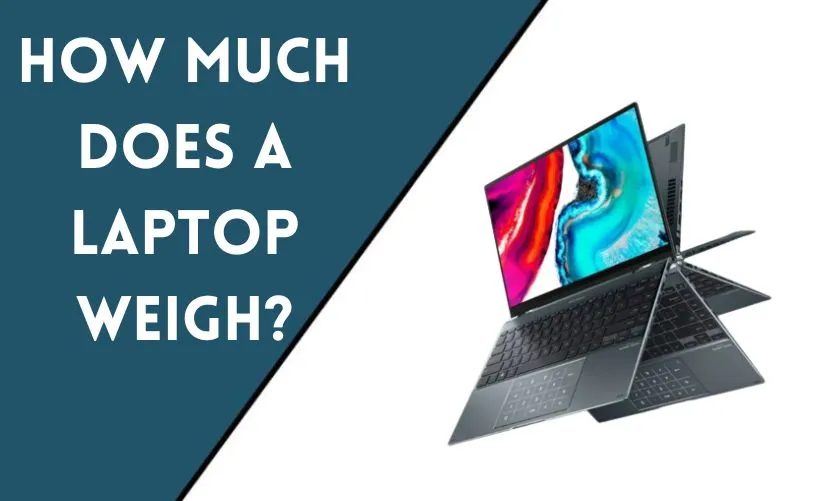
In today’s digital era, laptops have become an essential tool for work, education, and entertainment. Whether you’re a student, a professional, or an avid gamer, knowing the weight of a laptop is crucial. The weight of a laptop can impact its portability, comfort, and ease of use. In this comprehensive guide, we will explore the factors that affect laptop weight, average weight ranges for different types of laptops and provide tips for choosing the right weight for your needs.
Importance of Knowing the Weight of a Laptop
Understanding the weight of a laptop is vital for several reasons. Firstly, if you frequently travel or carry your laptop on the go, a lightweight option can significantly enhance your mobility. A heavy laptop can cause strain on your back and shoulders, leading to discomfort and potential health issues in the long run. Secondly, if you plan to use your laptop in various locations, such as coffee shops or libraries, a lightweight model will be more convenient to carry around. Lastly, if you are a frequent flyer, knowing the weight of your laptop is essential to ensure it complies with airline carry-on restrictions.
Factors Affecting Laptop Weight
The weight of a laptop is influenced by various factors, including:
Screen Size and Form Factor
Laptops with smaller screen sizes and compact form factors tend to be lighter than larger models. Ultrabooks and 2-in-1 laptops are designed to be lightweight and slim, making them ideal for users who prioritize portability.
Material and Build Quality
The choice of materials used in a laptop’s construction plays a significant role in determining its weight. Laptops made with lightweight materials like carbon fiber or magnesium alloy are generally lighter compared to those constructed with heavier materials like aluminum.
Components and Features
The components and features integrated into a laptop also contribute to its weight. High-performance laptops designed for gaming or intensive tasks often include powerful processors, dedicated graphics cards, and additional cooling mechanisms, which can increase their weight.
Average Laptop Weight Ranges
Laptop weights can vary widely based on their intended usage and target audience. Here are the average weight ranges for different types of laptops:
Ultra-Portable Laptops
Ultra-portable laptops, also known as ultrabooks, are designed to be lightweight and slim. They typically weigh between 2 to 3 pounds (0.9 to 1.4 kilograms), making them highly portable and suitable for users who prioritize mobility.
Mainstream Laptops
Mainstream laptops strike a balance between performance and portability. They usually weigh between 4 to 6 pounds (1.8 to 2.7 kilograms), making them suitable for everyday tasks, such as web browsing, document editing, and multimedia consumption.
Gaming Laptops
Gaming laptops are designed to handle demanding games and multimedia tasks. Due to their powerful hardware, they tend to be heavier, ranging from 6 to 9 pounds (2.7 to 4.1 kilograms). While heavier, they offer superior graphics and processing capabilities.
Workstation Laptops
Workstation laptops are built for professionals working with resource-intensive applications like video editing or 3D rendering. These laptops can weigh anywhere from 8 to 12 pounds (3.6 to 5.4 kilograms) due to their robust hardware and enhanced cooling systems.
Lightweight Laptop Brands and Models
Several laptop brands offer lightweight options for users seeking maximum portability. Some notable brands include:
- Apple MacBook Air
- Dell XPS series
- Lenovo ThinkPad X1 Carbon
- ASUS ZenBook series
- HP Spectre series
These brands have models that prioritize lightweight design without compromising on performance or features.
Impact of Weight on Portability and Mobility
The weight of a laptop has a direct impact on its portability and mobility. A lighter laptop allows for easy transportation, whether it’s in a backpack or a laptop bag. It also reduces strain on your body, enabling you to work comfortably for extended periods.
Choosing the Right Weight for Your Needs
When selecting a laptop, consider your specific needs and use cases. If you’re frequently on the move, prioritize a lightweight option. However, if you require a laptop with powerful specifications for gaming or professional work, a slightly heavier model may be necessary. Finding the right balance between weight and performance is crucial.
Tips for Reducing Laptop Weight
If you already own a laptop and want to reduce its weight, here are a few tips:
- Opt for a smaller screen size or a compact form factor.
- Consider laptops made with lightweight materials like carbon fiber.
- Choose models with integrated or onboard graphics to avoid the extra weight of a dedicated graphics card.
- Select SSD storage instead of traditional hard drives as they are lighter and more energy-efficient.
- Remove any unnecessary accessories or attachments that add unnecessary weight.
Conclusion
In conclusion, understanding the weight of a laptop is important for choosing a device that aligns with your lifestyle and needs. Factors such as screen size, materials, and components greatly influence laptop weight. By considering your usage requirements and mobility preferences, you can find a laptop that strikes the right balance between weight and performance.
Frequently Asked Questions
Can I carry a laptop that exceeds the weight limit set by airlines?
It’s essential to adhere to airline regulations regarding carry-on luggage weight limits. Exceeding the weight limit may result in additional fees or requiring you to check in your laptop as baggage.
Are there any lightweight laptops suitable for gaming?
Yes, several laptop brands offer lightweight gaming laptops that prioritize portability without compromising on gaming performance. These models often feature powerful processors and dedicated graphics cards.
Can a lightweight laptop deliver sufficient processing power for demanding tasks?
Yes, many lightweight laptops are designed to deliver excellent performance, including handling resource-intensive tasks. However, it’s essential to select a laptop with specifications that meet your specific requirements.
Are there any trade-offs in choosing a lightweight laptop?
Lightweight laptops may sacrifice certain features or have limited upgrade options due to their slim and lightweight designs. It’s crucial to assess your priorities and select a laptop that aligns with your needs.
Are there any ergonomic considerations when using a lightweight laptop?
While lightweight laptops can enhance portability, they may have smaller keyboards or less robust cooling systems. Consider using external peripherals and maintaining proper posture to ensure ergonomic.










